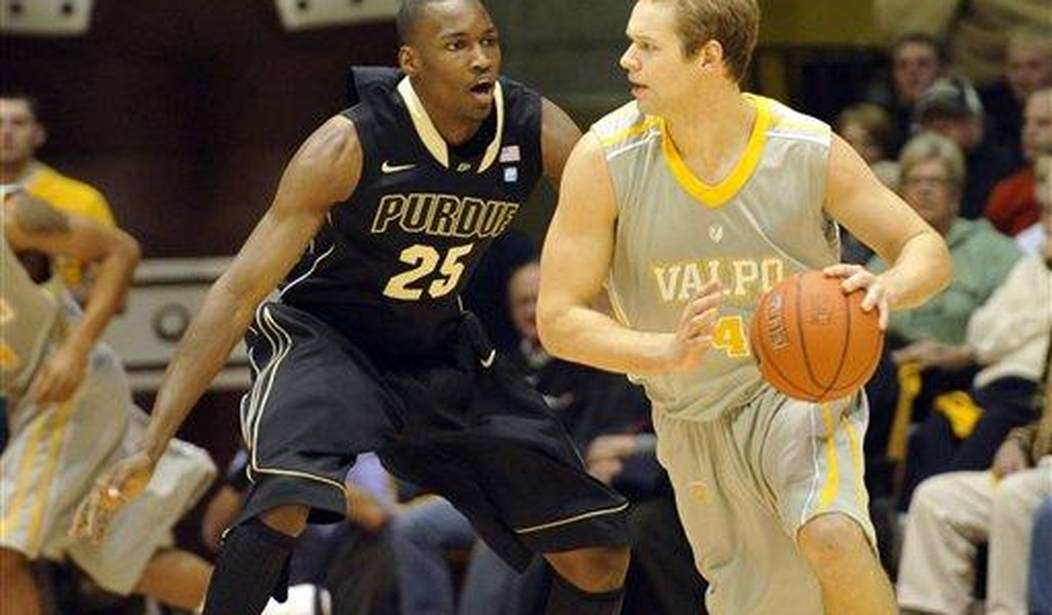Our long national nightmare is over: all decent, properly woke people will be relieved and grateful that the one-time bastion of racism and Islamophobia in Indiana, Valparaiso University, is dropping its Crusader nickname and mascot. According to Valparaiso’s interim president Colette Irwin-Knott, “the negative connotation and violence associated with the Crusader imagery are not reflective of Valpo’s mission and values, which promote a welcoming and inclusive community. This is the decision that best reflects our values and community.” Yes, of course. Everyone knows that defending Western civilization, and being proud of those who did so, is out of the question these days. Nothing could be more unwoke.
Valparaiso student president Kaitlyn Steinhiser elaborated on the decision by saying: “The Crusader does not [represent the university] effectively. Valpo is and always has been a faith-based institution, and we want to make sure our symbolism is in alignment with our beliefs and speaks to the core values of the Lutheran ethos. At Valpo, we strive to seek truth, serve generously and cultivate hope. We do not believe having the Crusader as our mascot portrays these values.”
In any case, all this shame over the Crusader name, and expiating renunciation, is completely unwarranted. As The History of Jihad From Muhammad to ISIS shows from primary sources, the Crusades were not, as the good people at Valparaiso University evidently assume, an unprovoked exercise of racist proto-colonialism directed against a peaceful Muslim world.
The Crusades were in reality a late, small-scale defensive response after 450 years of jihad attacks had conquered and Islamicized what had previously been over half of the Christian world.
Armies animated by the jihad ideology (or that eventually justified their actions by recourse to it) had occupied much of the Middle East, North Africa, and Spain — as well as Persia and much of India — centuries before a Crusade was even contemplated. They had entered France and besieged Constantinople, the capital of the Christian Eastern Roman (Byzantine) Empire, several times.
The Seljuk Turks’ victory over the Byzantines at Manzikert in 1071, when they took the Emperor Romanus IV Diogenes prisoner, opened all of Asia Minor to them. In 1076, they conquered Syria; in 1077, Jerusalem. The Seljuk Emir Atsiz bin Uwaq promised not to harm the inhabitants of Jerusalem, but once his men had entered the city, they murdered 3,000 people.
That same year, the Seljuks established the sultanate of Rum (Rome, referring to the New Rome, Constantinople) in Nicaea, perilously close to Constantinople itself; from there they continued to threaten the Byzantines and harass the Christians all over their new domains. The Byzantine Empire, which before Islam’s wars of conquest had ruled over a vast expanse including southern Italy, North Africa, the Middle East, and Arabia, was reduced to little more than Greece. It looked as if its demise at the hands of the Seljuks was imminent.
The Church of Constantinople considered the Pope a schismatic and had squabbled with him for centuries, but the new Byzantine Emperor Alexius I Comnenus swallowed his pride and appealed for help.
And that is how the First Crusade came about: it was a response to the Byzantine Emperor’s call for help against Muslim invaders who threatened to destroy the Christian empire.
It is undeniable that the Crusaders committed many atrocities. So did their jihadi opponents. But in the main, the Crusader endeavor was not an exercise in imperialism or racism, but an attempt to protect Christians from jihad attacks.
So why shouldn’t Valparaiso University have a Crusader mascot and take pride in its own culture and heritage? Because that culture is spent, and weak, and confused, and anxious to appease a much more confident alternative culture that regards the Crusades as an affront.
The West continues its cultural self-abnegation in the face of the chimera of “Islamophobia” — a propaganda neologism designed to make people ashamed of defending themselves and their homeland against a newly aggressive Islamic jihad.
Valparaiso University is not alone. The rush to disavow any connection to Crusaders is part of a larger tendency to remain in denial about the jihad aggression that threatens so many in the world today. It manifests an acceptance of the Islamic view of history — which has been aggressively thrust upon the West in recent decades — that blames the origin of conflict between Muslims and Christians upon the evil Crusaders despite the timeline that proves this false.
At a time when the Crusaders’ ancient jihadi foes are newly invigorated and more aggressive than they have been for centuries, this cultural self-hatred is a recipe for disaster.
And as an aside, it’s interesting to note that Valparaiso University is dropping its nickname because it evidently thinks it glorifies the Crusaders, while the Cleveland Indians and Washington Redskins, and others have dropped or are in the process of dropping theirs because they think they’re demeaning to Native Americans. So are sports nicknames a sign of approval or of hatred and ridicule? The answer all depends on what will give you the most woke outcome.
Robert Spencer is the director of Jihad Watch and a Shillman Fellow at the David Horowitz Freedom Center. He is author of 21 books, including the New York Times bestsellers The Politically Incorrect Guide to Islam (and the Crusades) and The Truth About Muhammad. His latest book is Rating America’s Presidents: An America-First Look at Who Is Best, Who Is Overrated, and Who Was An Absolute Disaster. Follow him on Twitter here. Like him on Facebook here.










Join the conversation as a VIP Member